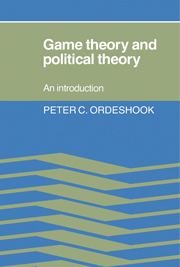Book contents
- Frontmatter
- Contents
- Preface
- Acknowledgments
- 1 Individual preference and individual choice
- 2 Individual preference and social choice
- 3 Basic theory of noncooperative games
- 4 Elections and two-person zero-sum games
- 5 Nonzero-sum games: political economy, public goods, and the prisoners' dilemma
- 6 Institutions, strategic voting, and agendas
- 7 Cooperative games and the characteristic function
- 8 The core
- 9 Solution theory
- 10 Repeated games and information: some research frontiers
- References and a guide to the literature
- Index
5 - Nonzero-sum games: political economy, public goods, and the prisoners' dilemma
Published online by Cambridge University Press: 21 March 2010
- Frontmatter
- Contents
- Preface
- Acknowledgments
- 1 Individual preference and individual choice
- 2 Individual preference and social choice
- 3 Basic theory of noncooperative games
- 4 Elections and two-person zero-sum games
- 5 Nonzero-sum games: political economy, public goods, and the prisoners' dilemma
- 6 Institutions, strategic voting, and agendas
- 7 Cooperative games and the characteristic function
- 8 The core
- 9 Solution theory
- 10 Repeated games and information: some research frontiers
- References and a guide to the literature
- Index
Summary
We can model many political situations as zero sum, and the tools that Chapter 4 develops are thus an important part of political theory. Nevertheless, the zero-sum assumption is a restriction that precludes modeling many other situations that are central to politics. If politics concerns the collective allocation of resources, and if those resources are not fixed, as they need not be in an expanding dynamic society, then the principal political processes are necessarily nonzero sum in character. This chapter begins the exploration of the more general class of nonzero-sum, noncooperative games by focusing on a particular game, the prisoners’ dilemma. We find this focus useful for several reasons. First, prisoners’ dilemmas involving two or more persons illustrate many of the problems that one is likely to encounter in applying noncooperative game theory to politics. Second, the prisoners’ dilemma itself models a great many key political situations, including the causes of market and governmental failure, the incentives for political participation, paradoxes of vote trading, and the disincentives of people to reveal truthfully their demand for publicly provided goods and services. And with the prisoners’ dilemma as our starting point, we can introduce an additional modification of the Nash equilibrium concept, Bayes's equilibria, as well as tax schemes (called demand-revelation mechanisms) that are designed to induce truthful revelation of preferences for the goods and services that governments produce or regulate.
Nonzero-sum games
In one sense, moving from zero-sum to nonzero-sum games is not a radical theoretical departure. The representation of a situation's extensive form and the analysis of that form depend not at all on whether the game is zero sum or nonzero sum.
- Type
- Chapter
- Information
- Game Theory and Political TheoryAn Introduction, pp. 203 - 242Publisher: Cambridge University PressPrint publication year: 1986
- 1
- Cited by



